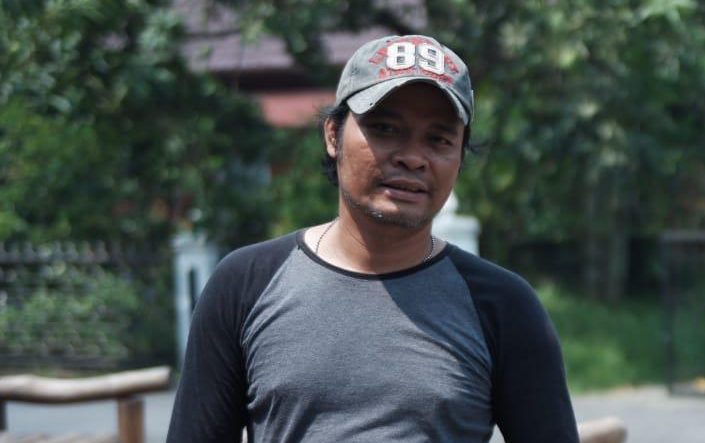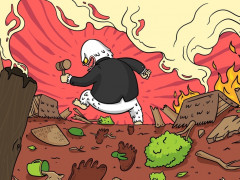Disregarding Peat Restoration causes Company Concession Areas to be Prone to Repeated Fires
By Yitno SupraptoThe Future of Forest and Land Fire Prevention Efforts during the Pandemic
The COVID-19 pandemic has greatly affected almost every aspect of human life on earth. There are hardly any activities or sectors of life that are not in shambles or at least shaken due to these complex situations.
Most of the human resources and the government's attention are currently focused on preventing and dealing with the impact of COVID-19. Development funds were also cut to be reallocated to the COVID-19 pandemic response budget, reaching a total of Rp405 trillion. The budget cut policy is specified in Presidential Regulation Number 54 of 2020 concerning Changes in the Structure and Details of the 2020 State Budget. A total of Rp. 95.7 trillion of the budget for line ministries have been reallocated to handle the COVID-19 pandemic. Budget cuts are done on funds allocated for goods, business trips, and capital expenditures. All the capital expenditures were further cut by Rp50 trillion.
The Ministry of Environment and Forestry is one of the line ministries experiencing a budget cut, with a total cut of Rp1.5 trillion. The cuts affected the budget for forest and land fire prevention, which experienced a 39% cut from the original amount. The National Disaster Management Agency (BNPB) as the front line of the land and forest fire fighting operations had to divide their concentration. They are more focused on handling the COVID-19 pandemic.
We don't know whether the BNPB forest and land fires prevention budget has been cut or not. However, based on the information we have received, the West Kalimantan Regional Disaster Management Agency (BPBD) who received its funding from the Local Budget (APBD), had 90% of its budget cut. The budget was then reallocated to handle the COVID-19 pandemic.
Fire fighting effectiveness
The Meteorology, Climatology, and Geophysical Agency (BMKG) predicts that this year's dry season will peak between August and September. The drought will almost certainly trigger forest and land fires, especially on peatlands. Peatland and forest fires do not only occur during the peak of the dry season but also before and after the peak. Based on experience, the haze will continue until October-November.
Last year, West Kalimantan ranked seventh
by forest and land fires area in Indonesia. Approximately 3,300 hectares of land were burned between January-July 2019. Incidents like these could repeat and become worse this year. That is if the government ignores the signs and considers forest and land fires as an ordinary event and handles it using ordinary measures.
Land and forest fire fighting operations require a lot of funds and the budget allocation is barely sufficient every year. Therefore, budget cuts will certainly affect forest and land fire prevention efforts. Last year alone, BNPB spent Rp 3.4 trillion to handle 747 forest and land fires cases in the country. This allocation is approximately half of the Rp 6.7 trillion ready-to-use funds allocated to the BNPB to handle 3,768 natural disasters in 2019.
During the current pandemic, the budget for land and forest fires is likely to overrun. An additional requirement must be met to ensure the fire fighting efforts comply with the health protocols to prevent the transmission of COVID-19. Officers and volunteers are required to wear standard personal protective equipment (PPE). All field equipment, including firefighting equipment, must also be disinfected before and after usage.
The challenge in extinguishing forest and land fires has increased because officers, volunteers, and residents have to maintain physical distancing. The logical consequence is that the number of personnel deployed to fight the fires must be reduced to avoid crowding, but this will affect the effectiveness of forest and land fire extinguishing.
Public transparency
The government is prioritizing prevention efforts in handling forest and land fires during the COVID-19 pandemic. It's not a new solution. The prevention program effectiveness is questionable. These efforts are always constrained by classic problems, namely limited budget and personnel, geographical constraints, and the lack of infrastructure support
Efforts to prevent forest and land fires are also experiencing difficulties during the COVID-19 pandemic. Information dissemination activities can no longer be freely held. Likewise, peat restoration has limited space for movement. In addition to being bound by compliance with health protocols, a number of villages have taken the initiative to impose a regional quarantine (lockdown). The Indonesian Army (TNI) and Indonesia National Police (Polri) personnel who have been involved in forest and land fire prevention and fire-fighting have also concentrated on dealing with the COVID-19 pandemic and its impacts.
The COVID-19 pandemic and forest and land fires are serious threats to the people of West Kalimantan. With regards to health impact, both disasters affected the same organs and caused similar symptoms. COVID-19 symptoms are increasingly difficult to treat if the patient has a history of other diseases or comorbidity. Likewise, Acute Respiratory Infection (ARI), a disease caused by exposure to the smoke from land and forest fires.
Several types of comorbidity are shared between COVID-19 and ARI, such as asthma, bronchitis, and respiratory and lung disorders. The groups of people who are susceptible to both diseases are also the same, namely infants, toddlers, and the elderly. Approximately 6,000 West Kalimantan residents reportedly suffered from ARI due to the haze last year. This could be a very serious problem if it occurs during the COVID-19 pandemic. The government must ensure access to health services for people with ARI, especially those who require ventilators and special treatment rooms.
The supervisory aspect is equally important. Calls, appeals, circulars, even regulations will become mere formalities if they are not adequately supervised. Based on our monitoring, the supervision has not been effective so far. This is evidenced by the recurring peatland and forest fires cases at the concession area owned by the same company. The supervisory and law enforcement actions are targeting the local cultivators, even though their activities are part of the local wisdom and are protected by law.
Limited funds and personnel, as well as geographical factors, are classic obstacles in the land concession holders' supervisory efforts. This clearly illustrates how well the forest and land fires prevention efforts will be during the pandemic. We have not heard of any strategic and tactical plans for dealing with forest and land fires and their impacts during the pandemic in West Kalimantan. At least no information on this has ever been publicly disclosed to the mass media.
It is important for the public to know the plan in order to increase public participation and oversight. Don't expect people to care if it is difficult for them to access such important information. The guarantee for every citizen’s right to obtain information is a constitutional mandate. Likewise, health services and the right to the environment are state obligations that are mandated by the government.
Health problems not only require treatment and medical action. A good and healthy living environment is just as important. ARI and COVID-19 are actually red flags signaling that environmental damage can no longer be tolerated.
*The author is the Executive Director of Walhi West Kalimantan and Coordinator of Simpul Jaringan Pantau Gambut - West Kalimantan
**THIS WRITING WAS PREVIOUSLY PUBLISHED IN PONTIANAKPOST.CO.ID ONLINE MEDIA ON 15 JULY 2020**




